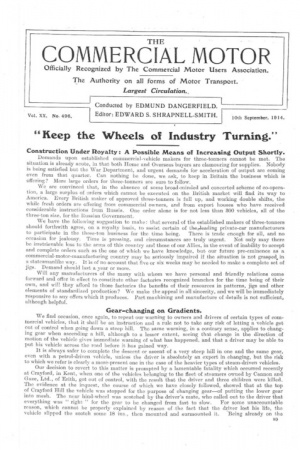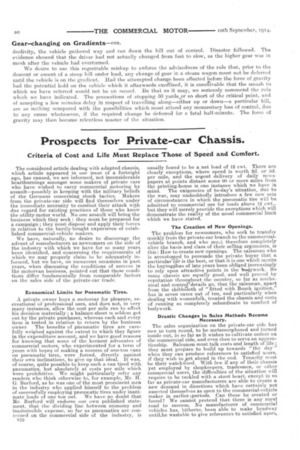"Keep the Wheels of Industry Turning."
Page 1

Page 2

If you've noticed an error in this article please click here to report it so we can fix it.
Construction Under Royalty : A Possible Means of Increasing Output Shortly.
Demands upon established commercial-vehicle makers for three-tonners cannot be met. The situation is already acute, in that both Home and Overseas buyers are clamouring for supplies. Nobody is being satisfied but the War Department, and urgent demands for acceleration of output are coming even from that quarter. Can nothing be done, we ask, to keep in Britain the business which is offering? More large orders for three-tanners are sure to follow.
We are convinced that, in the absence of some broad-minded and concerted scheme of co-operation, a large surplus of orders which cannot be executed an the British market will find its way to America. Every British maker of approved three-tonners is full up, and working double shifts, the while fresh orders are offering from commercial owners, and from export houses who have received considerable instructions from Russia. One order alone is for not less than 300 vehicles, all of the three-ton size, for the Russian Government.
We have the following suggestion to make: that several of the established makers of three-tonners should forthwith agree, on a royalty basis, to assist certain of thekdeading private-car manufacturers to participate in the, three-ton business for the time being. There is trade enough for all, and no occasion for jealousy. Time is pressing, and circumstances are truly urgent. Not only may there be irretrievable loss to the arms of this country and those of our Allies, in the event of inability to accept and complete orders such as the one of which we have knowledge, but our future pre-eminence as a commercial-motor-manufacturing country may be seriously impaired if the situation is not graape4. in a statesmanlike way. his of no account that five or six weeks may be needed to make a complete set of jigs. Demand should last a year or more.
Will any manufacturers of the many with whom we have personal and• friendly relations come forward and offer in effect to constitute other factories recognized branches for the time being of their own, and will they afford to those factories the benefits of their resources in patterns, jigs and other elements of standardized production? We make the appeal in all sincerity, and we will be immediately responsive to any offers which it produces. Part machining and manufacture of details is not sufficient, although helpful.
Gear-changing on Gradients.
We find occasion, once again, to repeat our warning to owners and drivers of certain types of commercial vehicles, that it shall be an instruction and a rule not to take any risk of letting a vehicle get out of control when going down a steep hill, The same warning, in a contrary sense, applies to changing gear when ascending a hill, although to a lesser extent, seeing that change in the direction . of motion of the vehicle gives immediate warning of what has happened, and that a driver may be able to put his vehicle across the road before it, has gained way. It is always safer to complete the descent or ascent of a very steep hill in one and the same gear, even with a petrol-driven vehicle, unless the driver is absolutely an expert in changing, but the risk to which we refer is clearly a More-present one in the case of the heavier types of steam-driven vehicles.
Our decision to revert to this matter is prompted by a lamentable fatality which occurred recently at Crayford, in Kent, when one of the vehicles belonging to the fleet of steamers owned by Cannon and Gaze, Ltd., of Erith, got out of control, with the result that the driver and three children were killed. The evidence at the inquest, the course of which we have closely followed, showed that at the top of Crayford Hill the vehicle was stopped for the purpose of changing gear—of putting the lower gear into mesh. The near hind-wheel was scotched by the driver's mate, who called out to the driver that everything was " right " for the gear to be changed from fast to slow. For some unaccountable reason, which cannot be properly explained by reason of the fact that the dryer lost his life, the vehicle slipped the scotch some 18 ins., then mounted and surmounted it. Being already on the
declivity, the vehicle gathered way and ran down the hill out of control. Disaster followed. The evidence showed that the driver had not actually changed from fast to slow, as the higher gear was in mesh after the vehicle had overturned.
We desire to use this regrettable mishap to enforce the advisedness of the rule that, prior to the descent or ascent of a steep hill under load, any change of gear in a steam wagon must not be deferred until the vehicle is on the gradient. Had the attempted change been effected before the force of gravity had the potential hold on the vehicle which it afterwards exeedised, it is conceivable that the smash to which we have referred would not be on record. Be that as it may, we seriously commend the rule which we have indicated. The precautions of stopping 50 yards,or so short of the critical point, and of accepting a few minutes delay in respect of travelling along—either up or down—a particular hill, are as nothing compared with the possibilities which must attend any momentary loss of control, due to any cause whatsoever, if the required change be deferred for a fatal half-minute. The force of gravity may then become relentless master of the situation.


















